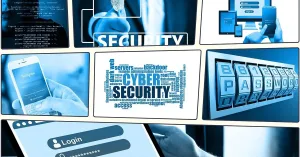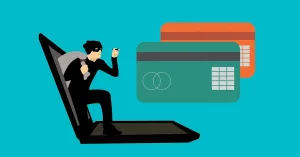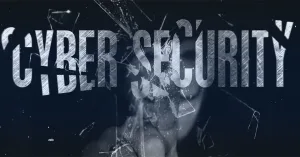Here at MoneyThumb, one of our top priorities is the safety of customers' data. One of the reasons our software is a bestseller in the PDF financial file converter niche has to do with the levels of security we offer. As a leader in this niche, today we are going to discuss types of online fraud and the urgency of protecting yourself and your personal information.
Over the last few decades, we have witnessed extreme growth on the internet. It has become a very important part of our everyday lives. And although the internet provides some great services, such as allowing us the convenience of shopping, banking, investing, and entertainment, online criminals are benefiting from these modern conveniences in illegal ways.
In reports on internet fraud, the largest threat comes from phishing SCAMS. Besides phishing, the other threats listed in the top 10 included false billing, investment fraud, identity theft, online shopping scams, hacking, bogus lotteries, and identity theft.
Phishing
Phishing is pronounced 'fishing.' The definition of Phishing relates to how criminals will 'fish' for sensitive information from people online using illicit and illegitimate tactics. As an example, they might mimic a website to fool users of its legitimacy by the look and feel of it. In other words, a phisher poses as a legal, legitimate institution or person in order to fool people into revealing sensitive, personal information. This could include credit card numbers, addresses, bank accounting information, and more.
They then use your personal information as something to sell on the black market. You will find that most phishing attempts are conducted over emails. So, if you receive what looks to be a credible email that asks you to take certain steps to proceed, or ask for money, there is a good chance that this email would redirect you to a phishing website intending harmful consequences. You must be very careful when opening a file in an email from someone you don't recognize. In fact, we'd warn against doing that at all. Only people and organizations you are familiar with should ever send you a file or attachment to open.
Malware
Another type of online fraud popular with cybercriminals is Malware, (malicious software.) Malware is produced by hackers normally as a program or a file that will be able to cause great harm to a website. Malware attacks can lead to a loss of business and/or reputation for webmasters.
There are several ways that hackers use Malware. They can inject code or exploit a vulnerability on a website. Hackers didn't get that way by being dumb. Never underestimate the skills of a cybercriminal. Even though they are criminals, unfortunately, they are using their powers for evil rather than good. An online hacker is smart and Malware can often be installed illegitimately by bypassing website security using sneaky methods. Everyone should have protection in place from malware. Two of the most popular forms of online security protection come from Norton and McAfee, for the average user.
Investment Fraud
Like any good thing that comes along, something or someone will find a way to exploit it. That is what happened when investors moved onto the internet. Cybercriminals were quick to follow. These investment fraudsters either run away with the money or keep adding new conditions for the returns. Savvy investors can see them coming from a mile off, but if you are new to investing online, do your homework and learn from those who have been there and learn what sites to trust before you begin.
Credit Card Fraud
Unfortunately, we all know someone who has been the victim of credit card fraud or we have been the victim ourselves. This fact means you should always keep your credit card information safe when using it for any online purchases. Credit card hackers have several ways they use to get your information. One way is by replacing a legitimate form you are filling out with your credit card information with a phishing form, which collects your credit card info. Then the hackers sell your information on the black market or use your credit card information to make illegal purchases. Another one of their tricks is to manipulate the payment method. Then the payment by the customer does not reach the seller, it gets credited to the hacker. The worst part of this is that this kind of hack does not usually show up immediately, as the seller remains clueless unless someone reports a forgery.
Identity Theft
Identity theft occurs when someone uses someone else's identity to gain financial advantages or obtain credit and other benefits the victim has to offer due to their good name. This always causes the person whose identity has been stolen disadvantages or losses especially if they are falsely held responsible for the perpetrator's actions.
Lottery or Inheritance Scam
Most of us have received some sort of email saying we have won a million dollars or something close to it if you will only pay this certain amount of money. Other times a lottery scam is disguised as a promise that you have been left money in a will by a distant relative, or there is a huge business opportunity you are missing out on if only you will pay a small amount for receiving something. Anything remotely like these, beware: this is a scam. No genuine lottery draw asks for prior payments from the winner. The payment is made after all charges and fees have been deducted. These are just a few of the ways a scammer will try to extort money from you.
False Billing
This is a form of fraud where a cybercriminal comes up with fake reasons to invoice you. The scammers are clever, so they will find a way to make these reasons seem valid, as they are highly targeted to customers by their current online needs and choices. An example would be license renewal requests being sent to people with vehicles, or a Paypal invoice for something you could have bought but didn't.
Protecting Yourself Against Online Fraud
As you can see from our list above of the major different types of online fraud, the internet can be a dangerous place. You must be vigilant in protecting your privacy and your personal information. Below are some of the best practices for a safer online experience.
1) Be more of a private person online.
Keep your social media account privacy settings on the stricter side. Be slow to offer your personal information to anyone online unless it is someone or a business dealing with those you know and trust. Don't accept all friend or connection requests, or engage in private messaging with a stranger unless you have a good reason. Many scammers will take the social media route to try and fool people.
2) Change passwords often.
The internet has constantly lurking bad bots and crawlers. These bad bots and crawlers try to get past your website/account’s security with the technology the hackers have created. This process, in cybersecurity terms, is called brute force. A unique password with upper case letters, lower case letters, numbers, symbols, etc. makes for a strong password. But, you should still make sure to change passwords regularly in the case that they have been infiltrated.
3) Update software/websites regularly.
Many people overlook this simple task, but just updating your website to the latest versions can reduce the risks of it getting compromised. Moreover, updates are nothing but mended and patched versions of the discovered vulnerabilities. Hence, using an outdated version of a website/plugin/theme/software with a publicly known vulnerability could leave your website in grave danger of being exploited. Always be prompt with updates.
4) Be wary of unsolicited emails/messages.
The internet is teeming with messages and emails from unknown & unverified senders. Take the information provided in these unsolicited emails with a grain of salt. They seldom are true and legitimate.
5) Get a security solution.
If you are an individual who uses the internet mostly for shopping and entertainment, basic protection from sites like Norton and McAfee is usually sufficient for your safety online. If you are a website owner, solidifying your website’s security with a premium security solution is recommended. A rock-solid firewall leverages continuous and comprehensive protection to your website and takes you one step closer to security. A good security solution shields your website from SQLi, bad bots, XSS, CSRF, OWASP Top 10 & 100+ other coming threats. It monitors your website 24/7 and has a pretty easy to manage dashboard.
Clearly, the internet is intertwined in our day-to-day lives. To be honest, we cannot do without it, so shutting it off completely is not an option. Instead, we need to be cleverer than the scammers. Be aware of their tactics and strive to have more secure cyberspace.
Sources: https://blog.shift4shop.com/types-of-internet-fraud, https://en.wikipedia.org/wiki/Internet_fraud





















Add comment